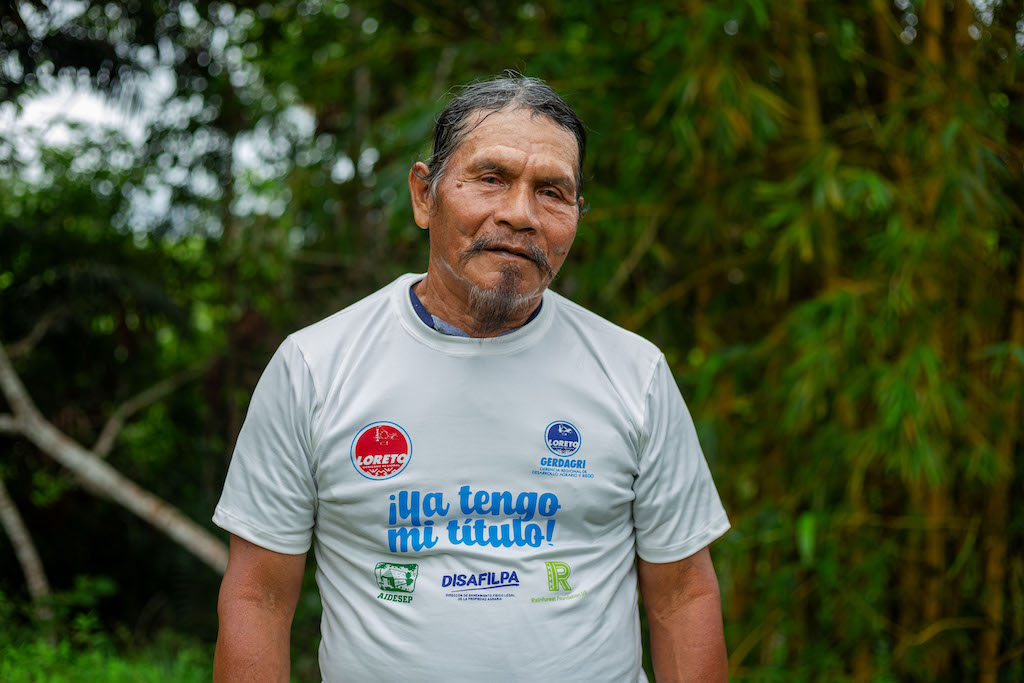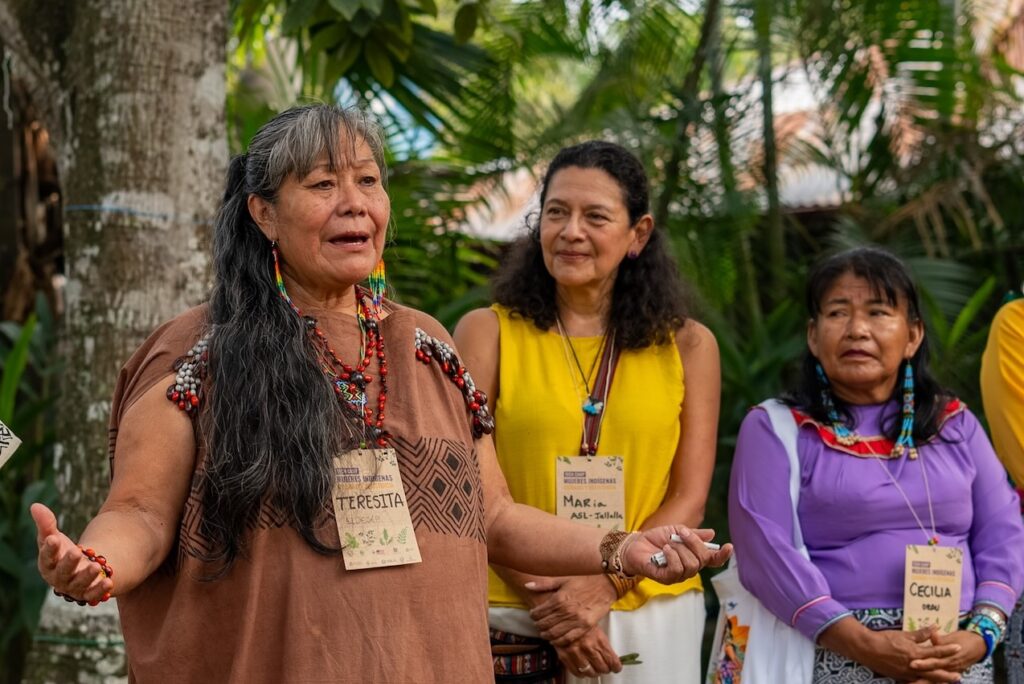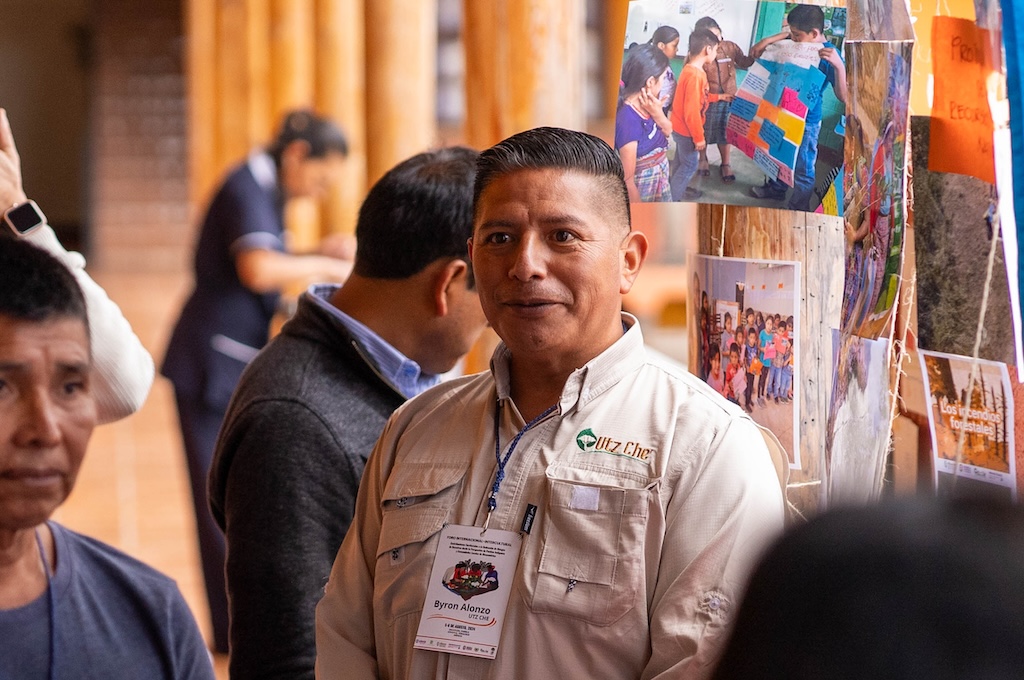As 2024 comes to a close, there’s much to reflect on. It was a year of immense challenges. Yet despite these challenges, we made significant achievements in protecting rainforests and supporting our Indigenous partners across the Amazon and Central America in their efforts to defend their ancestral territories—making 2024 a year defined by resilience, hope, and collaboration.
We invite you to take a closer look at some of the inspiring achievements led by our Indigenous partners on the frontlines of rainforest protection. Their courage and dedication remind us that meaningful progress isn’t just possible—it’s already happening. This is the hope we hold for our shared future.
Securing Land Rights: A Historic Victory for Indigenous Communities

“Today we can say that our lands are indeed ours, and we can defend ourselves from any aggression that arrives at our community,”- Anibal Oliveira, Indigenous Ticuna leader of the San Salvador community.
In the Peruvian Amazon, 20 Indigenous communities achieved a historic milestone by securing legal titles to their ancestral lands. This victory protects 75,000 acres of rainforest—an area three times the size of Manhattan—and underscores the vital role of Indigenous stewardship in rainforest protection. Land titles are essential to Indigenous peoples as they secure legal rights to their ancestral lands, meaning these communities are better able to protect their territories, cultures, and livelihoods from external threats. Rainforest Foundation US (RFUS), in partnership with the Interethnic Association for the Development of the Peruvian Rainforest (AIDESEP) and the regional government, played a pivotal role in this success by integrating Indigenous leadership with cutting-edge mapping and satellite technology to expedite the titling process.
Elevating Indigenous Women’s Leadership

“Before, women were not seen in territorial monitoring. It was a man’s space. But now women can do it too.” – Teresita Antazu López, a leader from AIDESEP
Indigenous women took center stage, breaking barriers and leading efforts to defend their territories and safeguard their cultures in 2024. RFUS supported these initiatives through two transformative projects. The Affirmative Measures Project provided resources and training to enhance Indigenous women’s participation in leadership and education. These programs have enabled women to actively engage in environmental monitoring and decision-making processes, ensuring their voices are central to the stewardship of their lands and cultures. In October, 50 Indigenous women leaders from across the Peruvian and Ecuadorian Amazon, gathered in Pucallpa, Peru, for “Indigenous Women: Care and Resistance.” This two-day meeting aimed at fostering collaboration and addressing the pressing threats to their territories, rights, and communities. These initiatives support Indigenous women to reshape traditions, amplify their voices, and play a pivotal role in the stewardship of their lands and cultures.
Strengthening Territorial Governance and Protection Across the Amazon
RFUS supported a series of “TechCamps” across the Peruvian and Ecuadorian Amazon, which brought together over 100 Indigenous leaders, including many women, to enhance their capacities to defend their territories and advocate for their rights. These events offered training in technology for forest monitoring, land mapping, and strategies to address illegal activities threatening their lands. By combining traditional knowledge with innovative tools, the TechCamps underscored the importance of equipping Indigenous communities with the skills and resources needed to protect their territories and biodiversity.
Supporting Indigenous Peoples to protect their rights in carbon markets
In Mesoamerica, RFUS worked alongside community leaders to advocate for high-integrity carbon markets that uphold the rights of Indigenous Peoples and Local Communities. Their unified efforts, supported by our ongoing collaboration, are paving the way for equitable climate solutions, ensuring that those who protect the forests have a seat at the table in critical decision-making processes.
Building Leadership and Resilience in Central America

“We can’t just run around putting out fires or rush to handle emergencies without addressing the root causes. We’ll only achieve this through alliances and collective efforts across organizations.”- Byron Alonzo, member of the Community Forestry Association of Guatemala-Utz Che’
RFUS and the Mesoamerican Alliance of Peoples and Forests (AMPB) concluded the three-year B’atz Regional Institutional Strengthening Project, supported by a $2 million USAID grant. The project established the Mesoamerican Territorial Fund, which invested $800,000 in over 20 regional initiatives, benefitting 40,000 people in the region. The project also supported AMPB’s Strategic Plan and Regional Gender and Climate Change Plan. Through the Mesoamerican Leadership School, 200 leaders, including women and youth, were trained in disaster risk management, enhancing governance and resilience across Mexico and Central America.
Pursuing Justice for Environmental Defenders
In a landmark decision, a Peruvian court sentenced four men to 28 years in prison for the 2014 murder of Edwin Chota, Jorge Ríos, Francisco Pinedo and Leoncio Quintícima, Ashéninka leaders from Alto Tamaya – Saweto, who were defending their lands against illegal logging. RFUS stood alongside the families and community throughout their decade-long fight, providing legal support, advocacy, and media outreach to amplify their pursuit for justice. This historic ruling honors the lives and legacies of the Saweto leaders and sets a critical precedent for Indigenous rights and environmental defender protection across the region.
Strengthening Community Rights in Brazil
In Roraima, Brazil, we joined forces with Indigenous leaders to address pressing climate challenges and strengthen community rights. This collaboration underscores the importance of unity and shared purpose in tackling global environmental and social issues, reinforcing our unwavering commitment to Indigenous territories.
Looking Ahead to 2025
Reflecting on these accomplishments, Suzanne Pelletier, Executive Director of Rainforest Foundation US, reminds us: “As our Indigenous partners have known for many years, strong, supportive communities are essential to lasting environmental change. While the specific approaches of modern and Indigenous science may vary, the underlying messages are the same—we must look not only at individual action but also at collaborative initiatives and policies that foster sustainable practices. By shifting our focus from personal choices to collective action, we can build a more effective movement to protect our planet, reframe our perspectives, and find inspiration in the possibility of a more sustainable and fulfilling future.”
The achievements of 2024 illuminate a path forward filled with hope, determination, and collective progress. As we move into 2025, we draw inspiration from the resilience of the communities we support and the tangible impacts of our shared efforts. Together with our partners, we will continue to amplify the rights of Indigenous peoples, protect critical ecosystems, and innovate and implement sustainable solutions that benefit both people and the planet.



